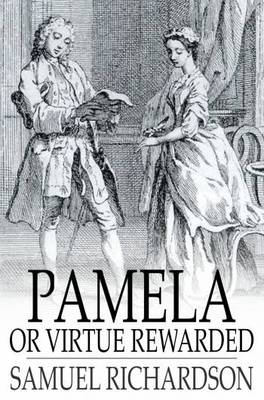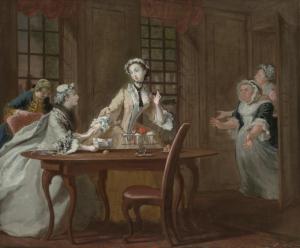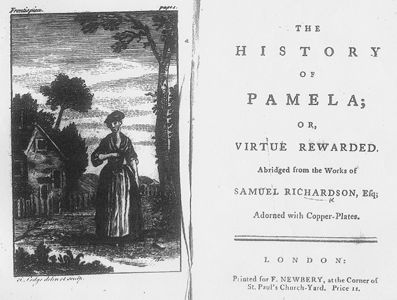- Because it’s a good read, with a heroine who has worked hard to improve her
 circumstances. Pamela shows physical and moral fortitude in the face of relentless attempts at seduction made by her employer – as well as an admirable ability to write letters and journal entries in some very, very trying circumstances. Pray for me, my dear father and mother; and don’t be angry, that I have not yet run away from this house, so late my comfort and delight, but now my terror and anguish. I am forced to break off hastily. Your dutiful and honest Daughter.
circumstances. Pamela shows physical and moral fortitude in the face of relentless attempts at seduction made by her employer – as well as an admirable ability to write letters and journal entries in some very, very trying circumstances. Pray for me, my dear father and mother; and don’t be angry, that I have not yet run away from this house, so late my comfort and delight, but now my terror and anguish. I am forced to break off hastily. Your dutiful and honest Daughter. - How many other texts could get away with this quantity of exclamation marks in one small section of text? Indeed, my dear father and mother, my heart is just broken! I can neither write as I should do, nor let it alone; for to whom but to you can I vent my griefs, and keep my heart from bursting! Wicked, wicked man! I have no patience when I think of him! But yet, don’t be frighted – for – I hope – I am honest!
- Richardson is wonderfully ingenious when it comes to creating cliff-hanger-situations: ‘My dear mother, I broke off abruptly my last letter, for I feared he was coming; and so it happened.’
- If you’ve any interest in social history, then this account of a servant voice from 1740 is wonderfully revealing. Pamela’s writings not only provide information about the running of a Georgian household, but also gives some ideas about the family circumstances of servants. In his reply to Pamela’s first letter, her father says, We are, it is true, very poor, and find it hard enough to live, though once, as you know, it was better with us. But we would sooner live upon the water, and, if possible, the clay of the ditches I contentedly dig, than live better at the price of our dear child’s ruin.

- Because it demonstrates the value of feedback: Richardson asked his wife and her friend to read the developing manuscript, and he used their domestic knowledge to create a ‘true’ picture of Pamela and her circumstances.
- Read it because it is an epistolary novel, and can remind us of how entertaining a good letter can be, whether fictional or not.
- Because,this novel offered, for the first time, a fiction in which (as Margaret A Doody puts it) a character speaks ‘for herself in her own manner’. Pamela is a voice from the working-class who, by standing her moral ground, challenges the moral-standards of the day, and examines the balances of power between the sexes. “Honest, foolish girl!” said he. “But is it not one part of honesty to be dutiful and grateful to your master?”
- Because the ‘voice’ of Pamela is convincing. Initially, Richardson hid his authorship, and allowed the public to assume Pamela, or Virtue Rewarded was an autobiographical account of a real event.
- Because even classic novels have flaws, and thinking about what doesn’t work, and why, is a useful way to focus our attention on our own writing.
- And finally, because having read this one, you could be tempted to try a contrasting, and loosely related comic novel by Henry Fielding, called, Joseph Andrews.
There are, of course, many other reasons for reading this novel. Please don’t be put off by the nearly three hundred years that have passed since Richardson published it . Although there are some differences in the way we use language, and a few words that we might have to look up, if you read, or write, historical fiction, I recommend this classic novel. 

Wow, you have stirred up memories. I remember reading this when studying A levels because I was fed up with Middlemarch (how could I say that!!!). It’s time to dig it out again, you’ve revived my interest. I think it was also the book that started me off reading historical fiction – good bad or indifferent! Thanks Cathum.
LikeLiked by 1 person
Glad you found this useful, it was quite fun thinking it up, and set me drifting back into enjoying it all over again.
LikeLiked by 1 person
To my shame, have read neither Pamela nor Jos. Andrewes – which would you recommend I read first?
LikeLike
Hmm, well all of the above advantages for reading Pamela should be weighed up against that fact that mostly it’s unintentionally funny – I think.
Joseph Andrews, on the other hand, is intentionally funny, but is laced with quite a lot of eighteenth century philosophy, so you have to be prepared to either skim across that, or look it up. I love Fielding, and if I could only have one of these two books, I’d choose him. It’s a lovely trip across country with loads of adventures, and misadventures, and some great earthy characters.
LikeLiked by 1 person
Thanks, Cathum. Went into a 2nd hand bookshop today and by chance there was Pamela and Joseph Andrews/Shamela … so I bought them both!
LikeLiked by 1 person
Impressive.
LikeLike
On P352/502 of Pamela, didn’t expect to like it, really enjoying it! Will let you know how I get on …
LikeLiked by 1 person
Page 352? That speaks for itself. Glad you’re liking it too. Look forward to hearing how the ending works for you…
LikeLiked by 1 person
Well, I wish I’d had your list handy when I was tearing my hair out ploughing my way through the mire, *cough*, I mean, novel! Funnily enough, I think I would have found it more tolerable had I seen it as an exercise in learning about the domestic sphere of the time, and I’ll bear that in mind when I tackle ‘Clarissa’ (groan!) 😉
LikeLiked by 1 person
Wow, Clarrissa – that’s still on my to-be-read list, and so far I only have volume 9 of the set – a 1902 hardback, which i think is an excellent excuse for putting off making a start.
Glad you enjoyed my list. I think it pays to keep your sense of humour with Richardson, who doesn’t seem to have employed much of that in his writing.
LikeLiked by 1 person